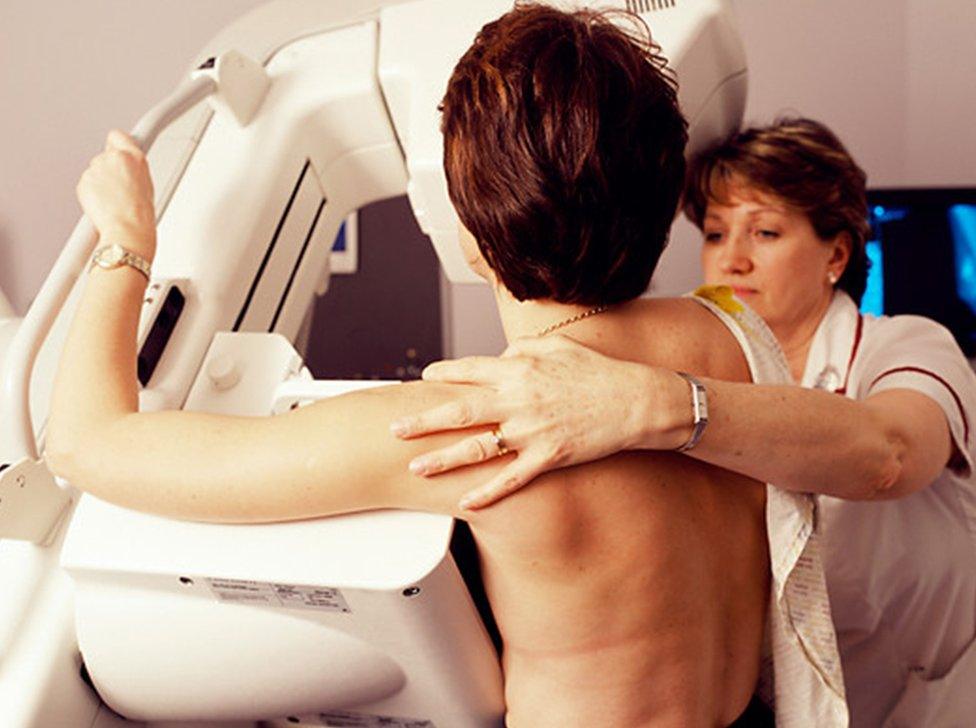Deprived areas see fewer early cancer diagnoses
- Published

More cancers, like breast cancer, are being detected early, but charities say more resources are needed
Almost a third of cancer patients in Scotland's most deprived areas were not diagnosed until the most advanced stage of the disease.
A report said there was a big disparity between people in the most deprived areas compared to those in more affluent parts.
Cancer charities called for more resources for deprived areas.
showed a small rise in the number of people diagnosed early.
DCE was launched by the Scottish Government in 2012 to raise the public's awareness of the national cancer screening programmes and also the early signs and symptoms of cancer to encourage help to be sought earlier.
Figures for the two years 2017 and 2018 showed that for the three most common forms of the disease - breast, lung and colorectal cancer - one in four (25.5%) was diagnosed at the earliest stage (stage 1).
That was an increase of 9.4% in the seven years of the programme.
Disparity
However, the report highlighted the difference in experiences of people in poor areas and those in more affluent areas.
Looking at the three most common cancers, 22.6% of those in the most deprived areas were diagnosed at stage 1 compared with 29.1% in the least deprived areas.
Gordon Matheson of the charity Cancer Research UK said: "It's welcome that DCE has seen a small increase in the number of people in Scotland being diagnosed early with cancer.
"However, it remains unacceptable that those living in Scotland's poorer communities have significantly less chance of being diagnosed at an early stage when treatment is more likely to be successful.
"For this to change it's essential we see more tailored resources being targeted at Scotland's poorer communities.
"The Scottish government must also ensure that there's enough staff to do this vital work, if we are to meet current and future need."
Over the seven years DCE has been in place there has been a rise in patients diagnosed at stage 1 with breast cancer - although there has been a small drop since 2014.
The percentage of patients diagnosed at stage 1 for colorectal cancer has fallen over the time period although it has risen since 2016.
Lung cancer has seen an increase in patients diagnosed at stage 1 although the increases have flattened over the last few years.
Survival rates
The report also showed for patients diagnosed with breast, colorectal or lung cancer in the most deprived areas of Scotland, the highest proportion were diagnosed at the most advanced stage of disease; stage 4 (29.7%).
For those living in the least deprived areas, the highest proportion were diagnosed at stage 2 (29.6%).
Scotland's Public Health Minister Joe FitzPatrick said early detection was crucial to continuing the improvement in survival rates with deaths from the disease down 10% in a decade.
He said: "More than 拢200m will deliver six elective treatment centres to allow people to be diagnosed and treated more quickly for planned surgery.
"Our DCE Programme has been developed to remind people across Scotland of their resilience and strength, in the hope that they'll act early to give themselves the best chance of finding cancer early.
"We are continuing to tackle variations in early detection rates, committing over 拢1m to health boards and third sector organisations since 2016, through our Health Inequalities Fund to improve screening uptake in groups least likely to participate.
"We are working to beat cancer, investing over 拢100m in our strategy as well as an additional 拢14m supporting health boards reduce waiting times."